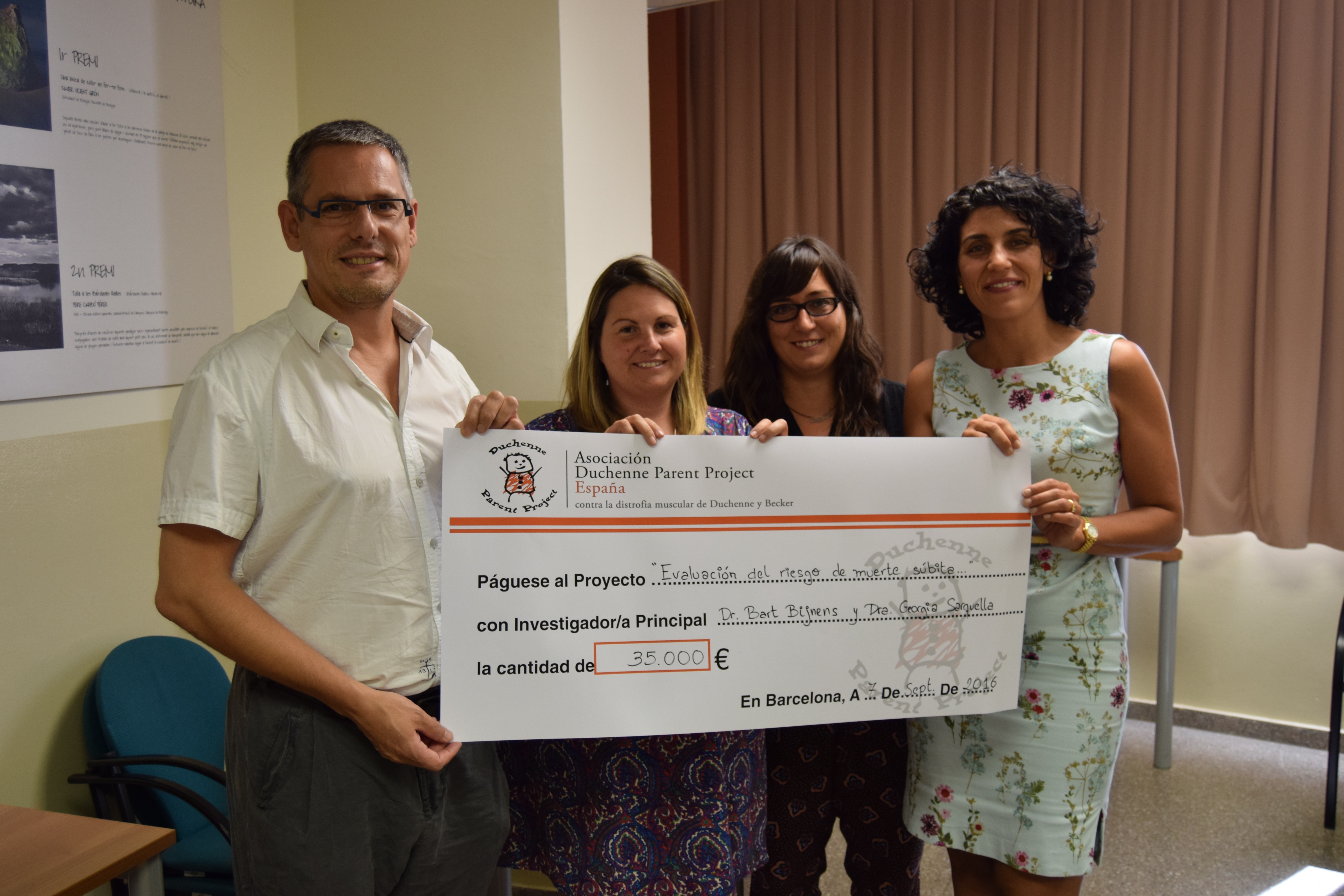PhySense and the Sant Joan de Déu Foundation to study Duchenne Muscular Dystrophy
PhySense and the Sant Joan de Déu Foundation to study Duchenne Muscular Dystrophy
Thanks to the help of the Duchenne Parent Project Spain that was awarded on 7 September to the principal investigators, Bart Bijnens, ICREA researcher with the Department of Information and Communication Technologies, and Georgia Sarquella-Brugada, paediatric cardiologist of the Sant Joan de Déu Foundation.

Duchenne Muscular Dystrophy (DMD) is a type of muscular dystrophy that evolves quickly, is usually hereditary, and affects one in 3,600 males. It is caused by a defective gene for dystrophin, a protein found in muscle tissue.
On the occasion of the 3rd World Dystrophy Awareness Day, on 7 September the Duchenne Dystrophy Project Spain at the Faculty of Biology of the University of Barcelona, awarded the four donations ranging from 35,000 to 50,000 euros each, to fund the four research projects previously selected at the second Call for Duchenne Research Grants, by the Scientific Advisory Committee and the research department of this institution.
One of the four selected projects is to evaluate the risk of sudden cardiac death (SCD) in patients with Duchenne Muscular Dystrophy. The principal investigators of this project are Bart Bijnens, co-coordinator of the Sensing in Physiology and Biomedicine (PhySense) research group and ICREA research professor with the Department of Information and Communication Technologies (DTIC) of UPF, and Georgia Sarquella-Brugada, paediatric cardiologist of the Sant Joan de Déu Foundation (Barcelona).
A computational model will be made based on cardiac images
As Duchenne patients grow, they begin to have more and more heart problems. The weakening of the heart muscle causes problems in the ability to pump a sufficient amount of blood, leading to possible alterations in heart rhythm, which can result in heart failure and arrhythmias. In fact, if not treated in time and intensively, it can lead to the sudden death of the patient.
In the project, “we will try to identify the mechanisms that bring about changes in cardiac structure and function, as well as alterations to heart rhythm”, stated Bijnens and Sarquella-Brugada, principal investigators of the study. Based on medical images obtained by continuous electrocardiography monitoring of heart rhythm, MRI and ultrasound, a database will be drawn up with which to build a computational model.
The computational model will allow the personalized study of the relationship between heart muscle structure and deformation and the general weakening of the heart, as well as the relation with the onset of irregular heart rhythm.
The study aims to gather a large amount of data with which to compare many patients with different symptoms and heart problems. Also, thanks to computer simulations, it will be possible to study in particular how a patient responds to changes in blood pressure, to medication, etc.
As the researchers explain, “the knowledge gained from the in-depth study of the heart will allow us to make suggestions as to how to efficiently organize heart monitoring, specifically optimized for Duchenne patients, as well as explore and suggest optimal ways for the prevention and treatment of possible deadly complications”.
This project brings together two teams with a wealth of experience whose activities complement each other. On the one hand, the team of Bart Bijnens, renowned internationally for his expertise in heart deformation and function. And on the other hand, the clinical team of Sarquella-Brugada, who heads a leading centre in paediatric cardiology dedicated to alterations in heart rhythm.
Reference project:
Bart Bijnens, Georgia Sarquella-Brugada, PIs, “Avaluació del risc de mort sobtada cardíaca en pacients Duchenne, relacionant la forma i deformació amb models computacionals” (Assessing the risk of sudden cardiac death in patients with Duchenne dystrophy, relating form and deformation with computational models), September 2016.
